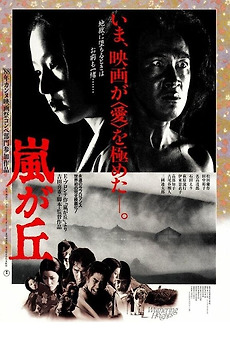
Wuthering Heights
1988 'Wuthering Heights' Directed by Yoshishige Yoshida
Synopsis
Young Kinu Yamabe is drawn to low-born Onimaru, who is vital and charismatic, but viewed by his father as a demon. After her first period, Kinu suffers the fate of any women born near the Sacred Mountain: she must leave the Mountain and serve as a priestess.
Cast
Yuko Tanaka Rentaro Mikuni Tatsuo Nadaka Eri Ishida Nagare Hagiwara Keiko Itô Masato Furuoya Tomoko Takabe Masao Imafuku Tarō Shigaki Yusaku Matsuda
143 mins More at IMDB TMDB
Sign in to log, rate or review
Share
RATINGS1 FAN3.5
★1 half-★ rating (1%)
1 ★ rating (1%)
2 ★½ ratings (1%)
14 ★★ ratings (8%)
10 ★★½ ratings (5%)
25 ★★★ ratings (14%)
52 ★★★½ ratings (28%)
54 ★★★★ ratings (30%)
15 ★★★★½ ratings (8%)
9 ★★★★★ ratings (5%)★★★★★
POPULAR REVIEWSMORE
Review by Emilia Rojas ★★★★ 1
Onimaru! It’s me, I’m Kinu
I’ve come home, I’m so cold
Let me in your window
10 likes
Review byLydia Roberts ★★★½ 3
Yoshida always fucks hard, just make another movie already you bastard
7 likes
Review by𝐅𝐥𝐚𝐦𝐢𝐧𝐠𝐨 ★★★★
A work of Yoshishige Yoshida without Mariko Okada! I haven't read the original book, however, it's wonderful to replace the wilderness of Yorkshire with the Kamakura era of Japan to create the atmosphere of ancient Japanese Shinto. I like the decor because it looks like "Ran" by Akira Kurosawa. Besides, Toru Takemitsu's music is also wonderful here as in Kurosawa's film. I really think there is a connection between Toru Takemitsu and masterpieces. Otherwise the festival scene, the murder scene, the tortured dialogue scenes, the whole atmosphere is unified and it's spectacular. Yusaku Matsuda is amazing. Particularly in the second half of the film. He's just a demon.
7 likes
RECENT REVIEWSMORE
Review by Brenda ★★★★
The only adaptation that brings that static aura that the book brings in its environment, but without leaving behind that effervescence of emotions that surround the characters.
I noticed that the western adaptations sin in not wanting to show the blatant and brutalized hatred, violence is a key word in the work, but I have never seen it explored as here in Japanese history.
The figure of the Morro itself (here it changed to the mountain) is placed as something central, this was the most incredible thing for me, only Japanese culture could translate the Morro as something almost divine or demonic.
Another interesting thing is the way in which social customs, purity or respect are not distanced from the English Victorian custom, they don't make much difference when placed in the eastern context, in fact they even become stronger.
Review by sam ★★
honestly if it wasn't an adaptation of wuthering heights i could have liked it, but it's so bad as adaptation of a beloved book that I'm incapable of doing so
Review by Rachael ★★★★
This might be my favourite Wuthering Heights adaptation to date, and I have seen quite a few of them. It's strength lies in its willingness to play fast and loose with the specifics of the novel, while somehow accurately evoking the core of it - no other version has captured the morbid and haunting qualities of Bronte's novel as well as this one.
This re-telling transposes the book's plot to medieval Japan. and its Heathcliff is cast as the demon-like Onimaru - he is brought into the home of Kinu (the film's Cathy) in much the same way as in the book, as an orphaned, outcast child rescued by her father. Her father also brings Kinu a present - in this version, a mirror rather than a whip.
This mirror becomes a key visual symbol throughout the film, recurring at critical moments and coming to function as a distillation of the unique, quasi-supernatural one-ness shared by Onimaru and Kinu. One of the novel's most famous lines is "I am Heathcliff", but most adaptations simply use this line as a line - it's spoken, occasionally with great drama attached (I'm thinking of you, Merle Oberon), but is never really explored or treated as much more than a trite sentiment.
